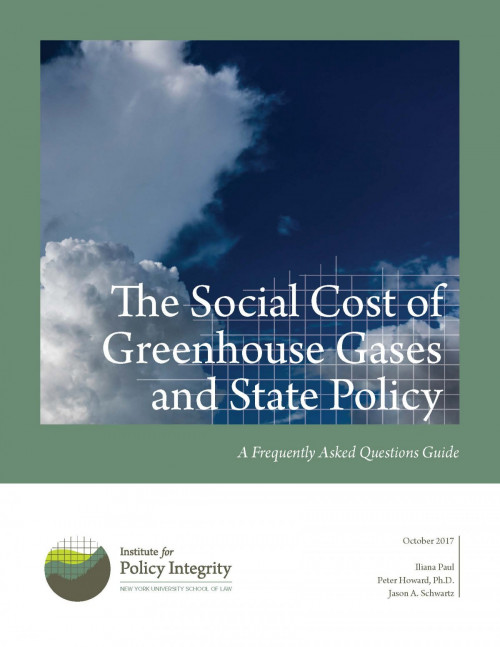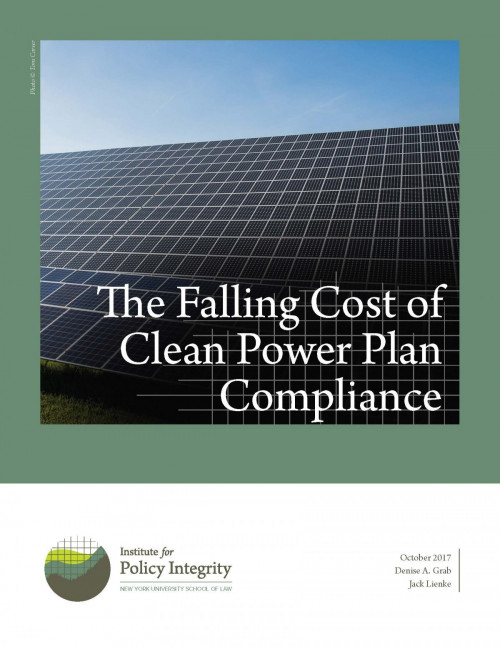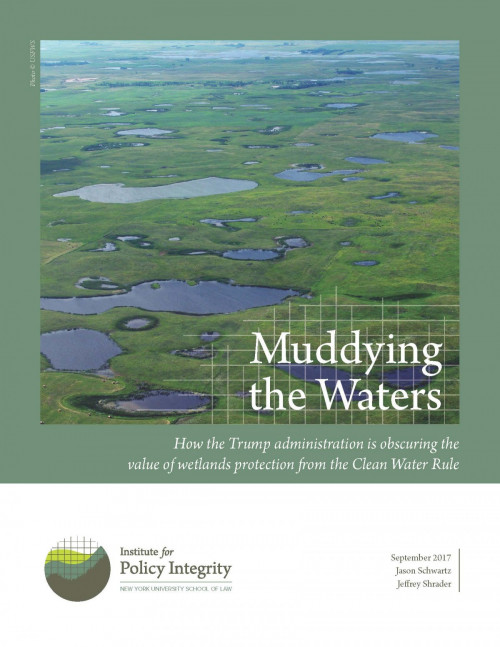-

The Social Cost of Greenhouse Gases and State Policy
A Frequently Asked Questions Guide
States can benefit from using the social cost of greenhouse gases to aid in making rational policy decisions in a transparent manner. Many states are already using these metrics in their decisionmaking. This report provides information on several issues related to the social cost of greenhouse gases, including discount rates, time horizons, and the global nature of the estimate.
-
Public Comments on Regulatory Review (CFTC, CPSC, Department of Education, PBGC, USDA)
Many federal agencies are requesting the public’s suggestions for rules to repeal or reform, tacitly implying that most regulations stifle economic growth. In comments to several agencies, we argue that regulatory review should consider the public benefits of regulation, not just the costs to regulated industries, and should prioritize review of rules for which actual costs and benefits diverge significantly from predicted costs and benefits.
-

The Falling Cost of Clean Power Plan Compliance
In 2015, the U.S. Environmental Protection Agency (EPA) released the Clean Power Plan, a Clean Air Act rule designed to address the threat of climate change by cutting carbon dioxide emissions from fossil fuel-fired power plants. As part of that rulemaking, the agency prepared an estimate of compliance costs, which it found would be far outweighed by the rule’s climate and health benefits. Since that time, changes in the electric sector have made it even cheaper to meet the rule’s emission targets than EPA anticipated. This report summarizes the findings of EPA’s 2015 Regulatory Impact Analysis; discusses subsequent market and policy developments that have lowered the cost of complying with the Clean Power Plan; and surveys more recent analyses by independent groups, which have estimated substantially lower compliance costs than EPA did.
-

Muddying the Waters
How the Trump administration is obscuring the value of wetlands protection from the Clean Water Rule
In 2015, the Environmental Protection Agency and Army Corps of Engineers revised the definition of the “waters of the United States” as part of the Clean Water Rule. This revised definition was expected to increase the wetland area subject to protection under the Clean Water Act, and an economic analysis conducted by the agencies at the time showed that the benefits of the rule would substantially outweigh the costs. Under the Trump administration, the agencies now propose to repeal the 2015 Clean Water Rule and have issued a revised economic analysis in support of that decision. In the new analysis, the agencies now claim that the majority of the benefits in the 2015 analysis cannot be quantified, making it appear that the Clean Water Rule is not cost-benefit justified. The agencies have violated many of their own requirements for conducting economic analysis to arrive at this conclusion, and a more comprehensive assessment of the evidence shows that the 2015 Clean Water Rule is still cost-benefit justified. Repealing the 2015 Rule would forgo substantial environmental and economic benefits.
-
Comments on Hydraulic Fracturing Rule Rescission
In proposing to rescind its two-year-old rule for managing hydraulic fracturing operations on federal and tribal lands, the Bureau of Land Management (BLM) fails to explain why the rescission’s estimated cost savings to industry justify the forgone benefits, such as environmental protection and increased worker safety. Our comments to BLM on the proposed rescission discuss the agency’s inadequate cost-benefit analysis, which does not sufficiently explain why changed circumstances in the past two years have altered the rule’s cost-benefit justification.
-
Joint Comments on Fuel Economy Standards and the Social Cost of Greenhouse Gases
Vehicle fuel economy standards set by the National Highway Traffic and Safety Administration (NHTSA) help reduce greenhouse gas emissions in the United States by making cars more fuel efficient. Our comments on the reconsideration argue that NHTSA should value the social cost of those emissions as robustly as possible, as they have done in the past. We encourage NHTSA to consider the social cost of greenhouse gases in both the rule’s Environmental Impact Statement and Regulatory Impact Analysis, and that it should use estimates considering global damages of climate change using a three percent or lower discount rate.
-
Response to a Critique of New York State’s Clean Energy Programs
A recent report criticizing New York’s Clean Energy Standard (“CES”) incorrectly argues that the CO2-reduction benefits from these programs are non-existent. The report claims that the benefits of reducing CO2 emissions with the CES, which are valued using the Social Cost of Carbon (“SCC”), are “effectively zero.” This conclusion and the preceding assertions are incorrect and inconsistent with basic economics. Our response highlights the flaws of the report and explains that New York’s CES in fact generates significant and crucial environmental benefits.
-
Comments on Delay of Department of Labor’s Fiduciary Rule
The Department of Labor’s Fiduciary Rule requires investment advisors to serve the best interests of their retiree clients. In August 2017, Labor proposed to stay the rule’s enforcement provisions. In our comments on the proposed delay, we argue that the delay violates basic administrative law principles.
-
Court Rules Against Bureau of Land Management’s Inadequate Consideration of Climate Effects
On September 15, 2017, the U.S. Court of Appeals for the 10th Circuit ruled that the Bureau of Land Management (BLM) violated the National Environmental Policy Act (NEPA) by providing an inadequate analysis of the likely climate impacts from four coal leases. This ruling, as argued in our press release on the case, establishes an important judicial precedent. Agencies cannot make unsupported assumptions about climate effects while still complying with NEPA and the Administrative Procedure Act.
-
Amicus Brief on Bureau of Land Management’s Waste Prevention Rule
The Bureau of Land Management’s (BLM’s) Waste Prevention Rule, enacted on November 18, 2016, sought to prevent oil and gas companies from wasting natural gas produced on public land. In June 2017, BLM stayed the rule by indefinitely postponing key compliance deadlines. In response, the states of California and New Mexico as well as several environmental organizations filed suit against BLM in the U.S. District Court for the Northern District of California. In our amicus brief in support of the plaintiffs, we argue that BLM failed to provide a reasoned explanation for the stay, as required by the Administrative Procedure Act, because BLM ignored the forgone benefits of the Waste Prevention Rule.
